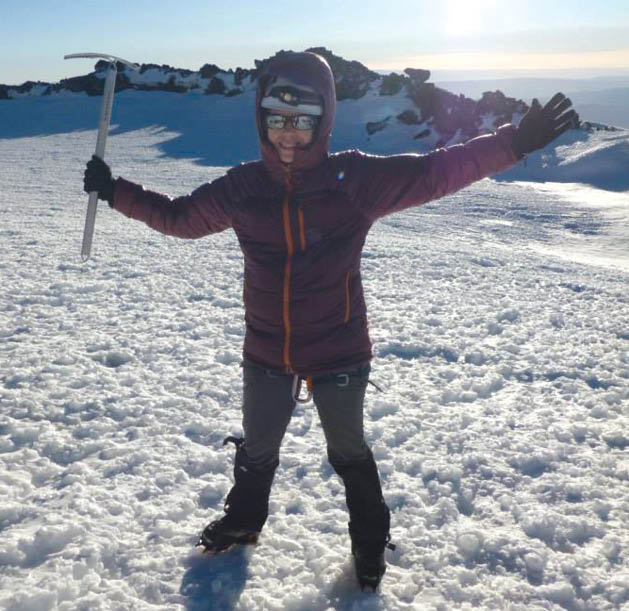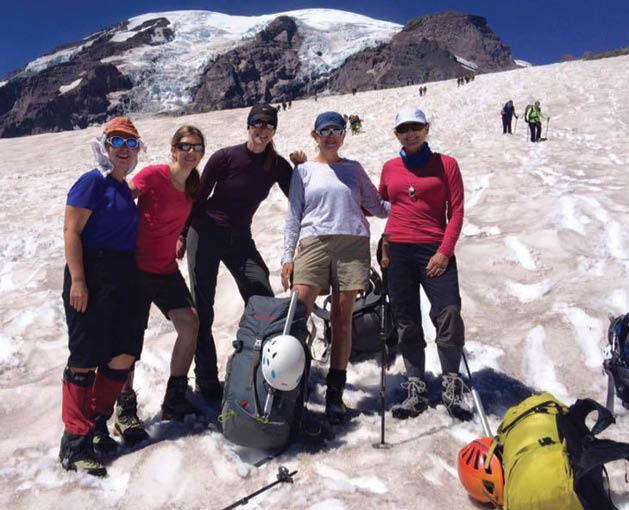One day last summer, Carrie Youngblood found what she had been searching for—and much more—14,000 feet above sea level on Mount Ranier.
After enduring a bout with serious illness related to the birth of her first child in 2013, the Plymouth resident had been bogged down by lingering depression. Youngblood intuitively decided she needed an “out of the box” experience to trigger an emotional rebound. The answer came in the form of a challenging, new avocation: mountain climbing.
Youngblood’s journey to the mountain top really began in fall 2012. Pregnant with her daughter, Ivy, the Plymouth resident began experiencing what she at first thought was normal morning sickness. But after several weeks of worsening daily nausea—and several doctor visits—Youngblood’s OB-GYN specialist, Dr. Karen McEvoy, determined that Youngblood had developed an extremely rare illness called hyperemesis gravidarum.
“Usually morning sickness goes away after the first trimester, but mine kept getting worse. It was like the worst food poisoning,” says Youngblood, an Eagan native who moved to Plymouth in 2008.
Unable to stomach food or even liquids, Youngblood kept losing weight daily until McEvoy prescribed medicine and liquid nutrition delivered through an IV pump.
As Youngblood’s pregnancy progressed, a series of 19 ultrasound exams indicated her fetus had stopped growing. As a result, Youngblood opted for an induced pregnancy after 37 weeks and, in May 2013, delivered her 4 lb. 15 oz. baby girl. After a nine-day hospital stay in Maple Grove, Youngblood returned home with a healthy daughter. Her constant nausea ended when she gave birth and she was once again able to eat normally—for the first time in about seven months. Youngblood eventually regained her normal weight. But her trials weren’t over.
For months, Youngblood struggled with postpartum depression and anxiety, which are common aftereffects of the hyperemesis gravidarum condition. “It was very hard to handle; it brought back all of those feelings—feelings of depression and isolation, people not understanding that it was not normal morning sickness,” she says. Youngblood also recalls feeling some jealousy toward other women who had experienced “easy” pregnancies, yet still complained. She also struggled with a bit of post-traumatic stress syndrome.
Youngblood became determined to turn her illness into a positive. After some introspection, she realized her illness had helped her to “no longer take health for granted, and realize that health is a gift that can easily be taken away in the blink of an eye,” she says. “I decided I didn’t want to sit around and waste my health like so many people who might waste too much time watching TV or on their phones. I started looking for something outside the box to push me out of my comfort zone.”


(Carrie Youngblood is just scratching the surface of her climbing passion on her first summit of Mt. Ranier, which she accomplished with a small group of all women [right] in summer 2015.)
Then, a friend told Youngblood about a Washington state-based company called RMI Expeditions, which offers mountain climbing trips, including climbs designed for novices and women-only climbs.
Youngblood didn’t consider herself the “outdoorsy” type, but decided to sign up for a guided, women-only climb scheduled for July 2015. “I had never done anything that far out of my comfort zone,” she says.
Each of the women spent about eight months training individually in their respective hometowns. “They wanted us to get in the best shape of our life,” says Youngblood, who worked with Anna Zawadski, a personal trainer employed by the REI store in Bloomington, to complete a seven-week mountain climbing preparation course. The course involved plenty of uphill hiking and running up and down bleachers and hills, carrying a 40-to- 50-pound backpack.
Zawadski says she was impressed by the intensity the novice climber brought to the seven-week training course. “She was a tough little cookie, even though she had so many medical concerns. She always came ready to work and left feeling like she had gotten something out of it.”
In late July, the nine women, ranging in age from 25 to 55, met in Mount Ranier National Park to start their vertical adventure. After a day of instruction by their guide, they started the climb to the 14,000-foot summit, which took two days.
Ranier is the fifth highest and considered the most difficult and technically challenging glaciated peak in the contiguous 48 states. The route Youngblood’s group took is called the Disappointment Cleaver route.
Beginning at 5,400 feet, the women climbed to Camp Muir (10,188 feet), a difficult, six-hour hike. After a few hours of rest, they began their six-hour trek to the top at midnight, using ropes, crampons, ice picks and helmets to traverse snow, ice, loose rock and deep crevasses. Reaching the peak, the group took some time to bask in clear sunshine before beginning the nine-hour trip down.
The climb completely lived up to Youngblood’s expectations, challenging the group both physically and psychologically. “It tested all of my strength and endurance; the altitude really works against you, and not all of the group made it to the top,” says Youngblood, taking some pride in the fact she was the only first-time climber who did.
She says one of the most gratifying aspects was the way the women bonded and helped each other. “If someone was falling behind, someone else would take up the slack and would encourage them,” she says.
Youngblood considers the Mount Ranier climb “one of the greatest experiences of my life,” she says. It also helped “fix” some negative emotions that had lingered for two years after her daughter’s birth.
In the process, Youngblood was bit by the climbing bug. She signed up for another guided climb that she completed last month, a six-day expedition to the top of 19,000-foot Mount Kilimanjaro, a volcanic mountain in Tanzania. She also plans to climb Mount Shuksan, in Washington state, in August via another RMI, all-women expedition.
Youngblood’s Mount Ranier experience has had positive, lasting effects. She has a new-found sense of confidence she can apply to whatever challenges she might encounter in life, as a mother, wife and pediatric home care nurse with Abundant Home Care in Plymouth. “Now, I can think,” she reflects, “‘This isn’t so hard—I was able to climb that mountain!’”
Interested in the same mountain climbing experience that Plymouth resident Carrie Youngblood experienced? Check out the website here.









